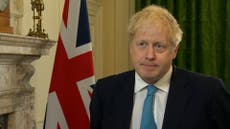Coronavirus: Scientific adviser warns Boris Johnson action to beat disease must be ‘fast and hard’
Baseline Tier 3 measures not enough to quash outbreak, says Sir Patrick Vallance
Your support helps us to tell the story
From reproductive rights to climate change to Big Tech, The Independent is on the ground when the story is developing. Whether it's investigating the financials of Elon Musk's pro-Trump PAC or producing our latest documentary, 'The A Word', which shines a light on the American women fighting for reproductive rights, we know how important it is to parse out the facts from the messaging.
At such a critical moment in US history, we need reporters on the ground. Your donation allows us to keep sending journalists to speak to both sides of the story.
The Independent is trusted by Americans across the entire political spectrum. And unlike many other quality news outlets, we choose not to lock Americans out of our reporting and analysis with paywalls. We believe quality journalism should be available to everyone, paid for by those who can afford it.
Your support makes all the difference.Boris Johnson’s chief scientific adviser Sir Patrick Vallance has issued a warning that action against coronavirus must be “fast and hard” to get the disease under control.
His comment comes after it was revealed that the prime ministers Scientific Advisory Group on Emergencies (Sage) recommended as long ago as 21 September that the country should go into a time-limited “circuit-breaker” lockdown to prevent the resurgence of the outbreak.
Sir Patrick said the idea then had been to get the reinfection rate - known as R - back below the threshold of one, above which the disease can grow exponentially.
But after a month of soaring infections since that advice was ignored, he said the UK was now in “a different situation”.
After a week of often inconclusive wrangling with local leaders over Mr Johnson’s plans to impose tighter restrictions in the north, Sir Patrick was asked whether people were dying because of politicians dithering.
He replied: “From a purely epidemiological point of view, it's important to go quite fast on this, it's important to make sure that you go hard enough to get the R below one.
“And the sooner you do that, the more you get this under control.”
Speaking alongside the prime minister at a 10 Downing Street press conference, Sir Patrick backed the judgment of chief medical officer Chris Whitty that the “baseline” mandatory restrictions for the toughest “Very High” level in Mr Johnson’s three-tier regional system would not be enough on their own to drive the virus down.
He said that the closure of pubs and bars would have to be supplemented by other measures, such as shutting down tourist attractions, gyms, hairdressers or libraries.
Under the new system, these additional restrictions are negotiated with each area taking on Tier 3 status. In Merseyside, gyms are closed, while they remain open in Lancashire, where soft-play centres and car-boot sales are banned.
“What we recommended In September was about taking a circuit break,” said Sir Patrick.
“The idea there was that actually a two-week interruption would set cases back probably to the levels they were in August, and then at those levels test and trace is more effective to keep control.
“So that was the reasoning behind that. Where we are now, of course, is a different situation.
“It is crucial that where the R is above one and the numbers are high we get the R below one.
“It’s crucial that's done, and there are a number of ways that it can be done.
“And as the chief medical officer said, Tier 3 baseline conditions on their own almost certainly aren't enough to get the R below one.
“But if you go to higher levels in the Tier 3 and start adding in other areas, they should be enough to get the R below one provided they are fully implemented and we all stick to them.”
Prof Vallance said that the judgments on local restrictions were “horrendously difficult” and said that Sage acknowledged that other factors needed to be taken into account, such as the harm done by reducing availability of healthcare, shutting down the economy or denying young people access to education.





Join our commenting forum
Join thought-provoking conversations, follow other Independent readers and see their replies
Comments